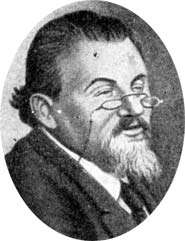Maxim Antonovich
| Maxim Alexeyevich Antonovich | |
|---|---|
 | |
| Born |
Максим Алексеевич Антонович May 9, 1835 Belopolye, Kharkov Governorate, Russian Empire/Ukraine |
| Died |
November 14, 1918 (aged 83) Petrograd, Soviet Russia |
| Occupation | critic, essayist, philosopher, |
| Years active | 1860-1916 |
Maxim Alexeyevich Antonovich (Russian: Макси́м Алексе́евич Антоно́вич, 9 May 1835, Belopolye, Kharkov Governorate, Ukraine, Russian Empire — 14 November 1918, Petrograd, Soviet Russia) was a Russian literary critic, essayist, memoirist, translator and philosopher.[1][2]
Biography
Maxim Antonovich was born to a family of a clergymen. After studying at the Kharkiv seminary he enrolled into the Saint Petersburg Theological Academy which he graduated in 1859.
Antonovich's literary career started in Sovremennik where several articles promoting the philosophy of materialism brought him the reputation of an "ideological heir to Chernyshevsky." As a head of the magazine's literary criticism department (which he became after Nikolai Dobrolyubov's death) Antonovich waged bitter feuds against Vremya, Epokha, and later Russkoye Slovo, after his slagging of Ivan Turgenev's Fathers and Sons in 1862 outraged Dmitry Pisarev and a violent confrontation ensued which Fyodor Dostoyevsky called "the break-up of the Russian nihilism".[2]
As Nekrasov refused Antonovich an invitation to the renewed Otechestvennye Zapiski, the latter in 1869 accused his former boss in "betrayal of the old friends" and turned to translation (Histoire de la Revolution Française by Louis Blanc, Physics by Balfour Stewart, The Teaching of Geography by Archibald Geikie, Textbook of Physiology by Michael Foster). In 1898—1916 Antonovich published memoirs on Nikolai Dobrolyubov, Nikolai Chernyshevsky, Nikolai Nekrasov and Pyotr Lavrov.[2]
References
- ↑ "Antonovich, Maxim Alekseyevich". The Brief Literary Encyclopedia. Moscow, 1962. P. 247. Retrieved 2015-01-13.
- 1 2 3 Tchernets, L. (1990). "Antonovich, Maxim Alekseyevich". Prosveshcheniye Publishers. Moscow. Russian Writers. Biobibliographical Dictionary. Retrieved 2015-01-13.
|